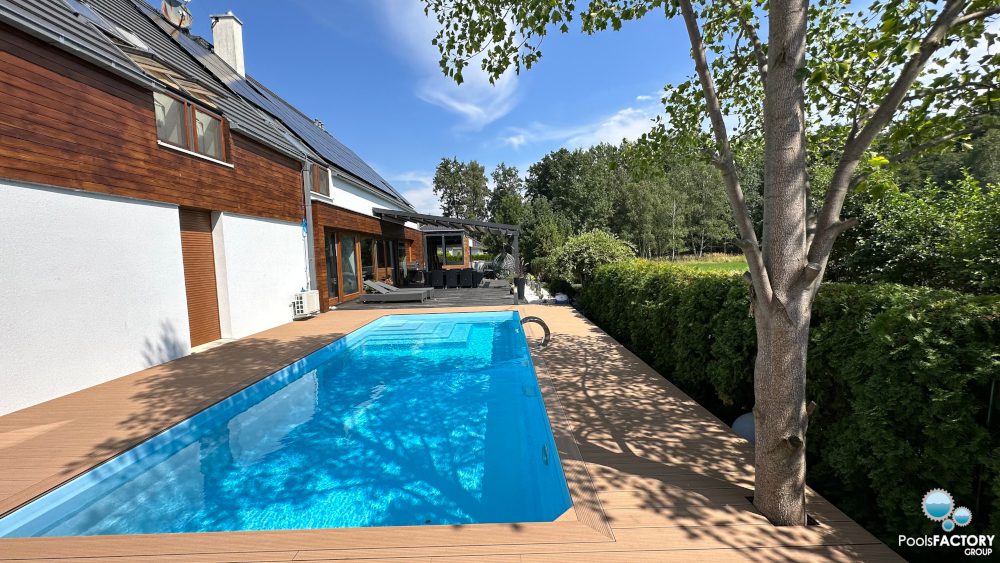YOUR CART
- 1 Optimal Water Temperature in a Pool for Swimmer Comfort
- 2 How to Maintain a Constant Water Temperature in the Pool Throughout the Season
- 3 The Impact of Different Water Temperatures in a Pool on Health and Well-being
- 4 How to Regulate Water Temperature in a Pool According to Preferences
- 5 Why Controlling Water Temperature in a Pool is Important for the Safety of Users
The temperature of the water in a pool is a key factor that affects the quality and safety of swimming. In both garden and indoor pools, maintaining the right water temperature significantly impacts the comfort and health of users. In this article, we present practical tips on how to control and regulate the water temperature in a pool to ensure optimal swimming conditions.
Optimal Water Temperature in a Pool for Swimmer Comfort
The optimal water temperature in a pool depends on its type and purpose. For recreational and garden pools, the recommended temperature is 26-28°C, while for indoor pools used for sports training, a slightly lower temperature of about 24-26°C is preferable. In children’s pools, it is advisable to maintain the temperature at 29-32°C to ensure their comfort and safety.
How Does Water Temperature Affect Comfort in Using the Pool?
The temperature of the water directly affects the comfort of those using the pool. Water that is too cold can lead to a decrease in body temperature, while water that is too warm can cause overheating and discomfort.
How to Maintain a Constant Water Temperature in the Pool Throughout the Season
Maintaining a constant water temperature in a pool requires the use of appropriate heating systems, such as heat pumps, electric heaters, or solar collectors. It is also important to regularly monitor the temperature and adjust the settings of the devices depending on weather conditions.
What Are the Optimal Water Temperature Conditions in a Pool?
The optimal water temperature conditions in a pool depend on its purpose, atmospheric conditions, and the preferences of users. It is important to adjust the water temperature to the activity to be performed in it.
The Impact of Different Water Temperatures in a Pool on Health and Well-being
Both too low and too high water temperatures in a pool can negatively impact health. Cold water can lead to hypothermia, while warm water promotes the growth of bacteria and can cause skin problems. However, cold baths can offer health benefits, such as stimulating the immune system and improving blood circulation.
How Can You Regulate the Water Temperature in a Pool?
Regulating the water temperature in a pool is possible through the use of appropriate heating systems and the use of pool covers, which help maintain heat and limit evaporation.
How to Regulate Water Temperature in a Pool According to Preferences
To adjust the water temperature to individual preferences, it is worth using thermostats and automatic control systems. This allows for the maintenance of a constant, chosen temperature, regardless of external weather conditions.
Why Controlling Water Temperature in a Pool is Important for the Safety of Users
Controlling the water temperature in a pool is essential to ensure the safety of swimmers. Improper temperature can lead to accidents, health problems, and the rapid development of dangerous microorganisms.
Does Water Temperature in a Pool Affect the Health and Safety of Users?
Yes, the water temperature in a pool has a direct impact on the health and safety of users. Improper temperature can cause discomfort, health problems, and increase the risk of accidents. The benefits of bathing in cooler water, such as stimulating the immune system and improving circulation, are also significant, though they require a cautious approach and may not be suitable for all users.
Q&A
Is 22 degrees water warm?
No, 22 degrees Celsius is rather cool for a pool and may be uncomfortable for most users.
How warm is the water in an indoor pool?
In indoor pools, the water temperature usually ranges around 26-28°C, which ensures comfortable swimming.
Is 30 degrees warm water?
Yes, 30 degrees Celsius is a warm water temperature in a pool, often used in children’s pools.
Why is the pool water cold?
Pool water can be cold due to the lack of a proper heating system, low ambient temperature, or ineffective heat insulation.









